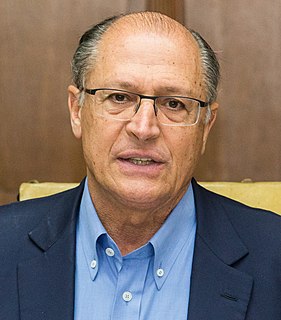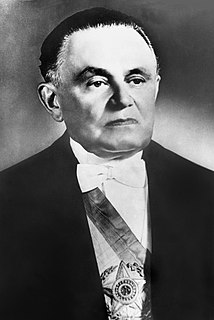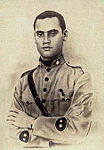
The Green Party is a political party in Brazil. It was constituted after the military dictatorship period and, like other Green Parties around the world, is committed to establishing a set of policies on ensuring social-equity and sustainable development. One of the party's founding members was the journalist and former anti-dictatorship revolutionary Fernando Gabeira, Alfredo Sirkis and Carlos Minc. The founding of the Rio de Janeiro section of the Brazilian Green Party was led by a delegation from the southern Brazilian state of Santa Catarina, composed among others by Olga Maria Carvalho Luz, Luiz Henrique Gevaerd Odebrecht, Marcos Bayer, and Consuelo Luz Lins.

Geraldo José Rodrigues de Alckmin Filho is a Brazilian politician who served as the Governor of São Paulo from 2001 to 2006, and then again from 2011 to 2018. He was the Brazilian Social Democracy Party (PSDB) presidential nominee for the 2018 presidential election. He is usually described by political analysts and supporters as a pro-business centrist, closely associated with the political and financial establishment.
José Maria, usually the Portuguese equivalent of the Spanish given name José María, may refer to:

Nova Andradina is a municipality located in the Brazilian state of Mato Grosso do Sul. Its population was 43,495 (2007) and its area is 4,776 km². It is known as the "Capital of the Ivinhema Valley."

General elections were held in Brazil on 4 October 1998, with a second round on 25 October. In the first round Fernando Henrique Cardoso was re-elected President and the governorships of 14 states were elected, in addition to all seats in the Chamber of Deputies and Legislative Assemblies, and one third of the seats in the Federal Senate. In the second round the governorships of 12 states and the Federal District were defined. This election was marked by the use of voting machines for the first time ever. They would have been used in all municipalities two years later, in the 2000 local elections.

João Belchior Marques Goulart was a Brazilian politician who served as the 24th President of Brazil until a military coup d'état deposed him on April 1, 1964. He is considered the last left-wing President of Brazil until Luiz Inácio Lula da Silva took office in 2003.

General elections were held in Brazil on 1 October 2006 to elect all seats in the Chamber of Deputies, one-third of the Federal Senate, and members of the Legislative Assemblies of the 26 states and the Federal District. As no candidate for president received over 50% of the vote, a second round run-off was held on 29 October between incumbent Luiz Inácio Lula da Silva and his challenger, Geraldo Alckmin. A second round was also required in 10 states where no candidate for governor received a majority. Lula won the second round with over 60% of the valid votes and secured a new four-year term.

Local elections will be held in the Province of Bulacan on May 13, 2013 as part of the 2013 general election. Voters will select candidates for all local positions: a town mayor, vice mayor and town councilors, as well as members of the Sangguniang Panlalawigan, the vice-governor, governor and representatives for the four districts of Bulacan.
Local elections will be held in the Province of Bukidnon on May 13, 2013 as part of the 2013 general election. Voters will select candidates for all local positions: a town mayor, vice mayor and town councilors, as well as members of the Sangguniang Panlalawigan, the vice-governor, governor and representatives for the four districts of Bukidnon.

Events in the year 1901 in Brazil.

Events in the year 1967 in Brazil.

Events in the year 1966 in Brazil.

Events in the year 1965 in Brazil.

Local elections will held in the Province of Batangas on May 9, 2016 as part of the 2016 general election. Voters will select candidates for all local positions: a town mayor, vice mayor and town councilors, as well as members of the Sangguniang Panlalawigan, the vice-governor, governor and for the six districts of Batangas.
The Bohol local elections held on May 9, 2016 as part of the 2016 Philippine general election. Registered voters elected leaders for local positions: a city or town mayor, vice mayor and town councilors, as well as three to four members of the Sangguniang Panlalawigan, the vice-governor, governor and three representatives for the three districts of Bohol.

Flávio Dino de Castro e Costa is a Brazilian attorney, politician and teacher. A former federal judge, Dino was elected to the Chamber of Deputies in 2006, serving a four-year term until 2011, representing the state of Maranhão. He ran for governor of Maranhão in the 2014 election, and was elected. He became the governor of Maranhão on January 1, 2015.
José Joaquim Cardoso de Melo Neto was a lawyer, professor and politician from Brazil.
Auro Soares de Moura Andrade, commonly known as Auro de Moura Andrade or Moura Andrade, was a Brazilian lawyer and politician. Was born in a wealthy family of farmers from the countryside, son of the cattle rancher Antônio Joaquim de Moura Andrade, known as "The King of the Cattle".

Direct presidential elections are held in Brazil as part of the general elections every four years, typically in October. The current electoral law provides for a two-round system in which a candidate must receive more than 50% of the vote to win in the first round; if no candidate passes the 50% threshold, a run-off is held between the top two candidates. Every candidate has a running mate who disputes the post of vice-president; prior to 1966, the vice-president was elected separately.


















